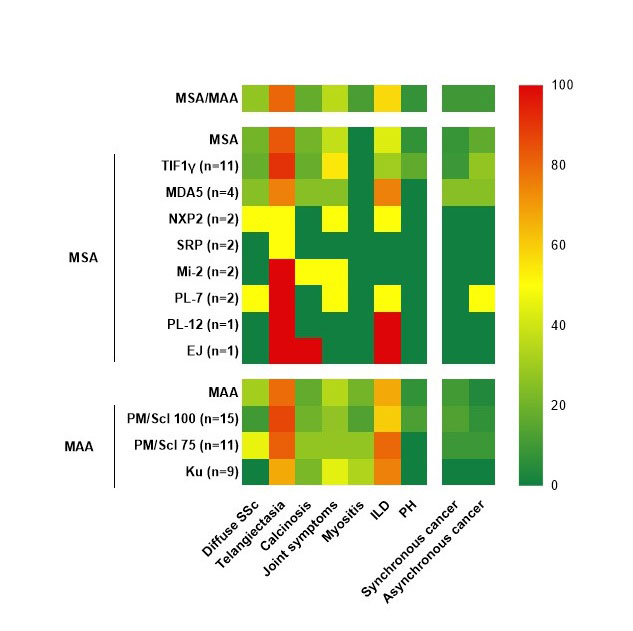Session Information
Date: Tuesday, November 12, 2019
Title: Systemic Sclerosis & Related Disorders – Clinical Poster III
Session Type: Poster Session (Tuesday)
Session Time: 9:00AM-11:00AM
Background/Purpose: In systemic sclerosis (SSc) and idiopathic inflammatory myopathies (IIM), auto-antibodies are used in daily practice as potent biomarkers of clinical phenotypes. This study aimed at estimating the prevalence of myositis-specific (MSA) and myositis-associated (MAA) autoantibodies in SSc, and studying their clinical associations.
Methods: We realized a cross-sectional, observational, single-center study. The sera of 300 consecutive patients were tested with myositis antibodies Euroimmun® and D-tek® immunoblot assays to estimate prevalence of MSA and MAA and study their clinical associations.
Results: Prevalence of MSA/MAA, MSA and MAA were 17%, 8.0% and 9.7%, respectively. Anti-PM/Scl 100 were found in 5.0% (95% confidence interval 2.8; 8.1); anti-PM/Scl 75 and anti-TIF1γ in 3.7% (1.8; 6.5); anti-Ku 3.0% (1.4; 5.6); anti-MDA5 in 1.3% (0.4; 3.4); anti-Mi-2β, anti-NXP2, anti-PL7 and anti-SRP in 0.7% (0.08; 2.4); anti-EJ and anti-PL-12 in 0.3% (0.01; 1.8) of patients. No reactivity against SAE1, Jo-1 or OJ was observed (Figure 1). Anti-PM/Scl 75 antibodies were associated with interstitial lung disease (80% vs 42%, p = 0.022) and myositis (27% vs 3%, p = 0.005); anti-PM/SCL 100 antibodies were associated with abdominal discomfort (38% vs 8%, p = 0.029); anti-Ku antibodies were associated with myositis (33% vs 3%, p = 0.003). There was a trend towards an association between anti-TIF1γ and cancer (27% vs 8%, p = 0.060) (Figure 2).
Conclusion: In this cross-sectional study of 300 SSc patients, the prevalence of MSA/MAA, MSA and MAA were 17%, 8.0% and 9.7%, respectively. MAA positivity was associated with ILD and myositis, but this study did not highlight any clinical associations with MSA positivity.
EJ: anti-glycyltRNA synthetase; Jo-1: anti-histidyl-tRNA synthetase; Ku: anti-DNA-dependent protein kinase; MAA, myositis associated antibodies; MDA5: anti-melanoma differentiation-associated gene 5; Mi-2: Anti-nuclear helicase/ATPase; MSA, myositis specific antibodies; OJ: anti-isoleucyl-tRNA synthetase; PM/Scl: anti-polymyositis scleroderma antigen; NXP2: anti-nuclear matrix protein 2; PL-7: anti-threonyl-tRNA synthetase; PL-12: anti-alanyl-tRNA synthetase; SRP: anti-signal recognition particle; TIF1γ: anti-transcriptional intermediary factor 1 gamma
EJ: anti-glycyltRNA synthetase; ILD, interstitial lung disease; Jo-1: anti-histidyl-tRNA synthetase; Ku: anti-DNA-dependent protein kinase; MAA, myositis associated antibodies; MDA5: anti-melanoma differentiation-associated gene 5; Mi-2 β: Anti-nuclear helicase/ATPase Béta; MSA, myositis specific antibodies; OJ: anti-isoleucyl-tRNA synthetase; PH, pulmonary hypertension; PM/Scl: anti-polymyositis scleroderma antigen; NXP2: anti-nuclear matrix protein 2; PL-7: anti-threonyl-tRNA synthetase; PL-12: anti-alanyl-tRNA synthetase; SRP: anti-signal recognition particle; TIF1γ: anti-transcriptional intermediary factor 1 gamma.
To cite this abstract in AMA style:
Leurs A, Dubucquoi S, Machuron F, Balden M, Renaud F, Rogeau S, Lopez B, LAMBERT M, Morell-Dubois S, Maillard H, Behal H, Hachulla E, Launay D, Sobanski V. Myositis-specific and -associated Antibodies in Systemic Sclerosis: Prevalence and Clinical Associations [abstract]. Arthritis Rheumatol. 2019; 71 (suppl 10). https://acrabstracts.org/abstract/myositis-specific-and-associated-antibodies-in-systemic-sclerosis-prevalence-and-clinical-associations/. Accessed .« Back to 2019 ACR/ARP Annual Meeting
ACR Meeting Abstracts - https://acrabstracts.org/abstract/myositis-specific-and-associated-antibodies-in-systemic-sclerosis-prevalence-and-clinical-associations/


